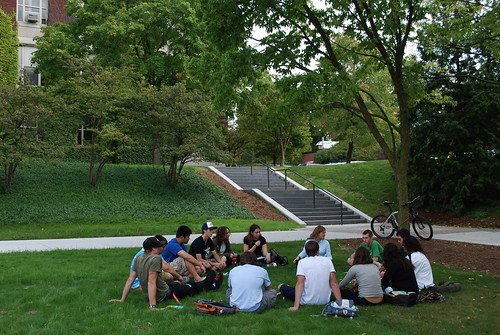
Over the summer, we require our first year students to read a book, something we've chosen with an environmental theme, something current and thought-provoking. Then during the third week of classes, we gather the students on campus, invite faculty and staff to join us, and split into small groups to talk about the book. Small Green College is a research institution, and most of my colleagues are scientists. Even as they volunteer to facilitate the discussion groups, they tease me about the event. "We're not a liberal arts college," they remind me.
Since I'm in charge of the event, I don't facilitate a small group, but walk around to make sure everything's okay. Once each group seems to be going fine and all late-coming students have been assimilated, I'll choose a group and nudge my way between two students sitting on the grass. It's interesting for me, as someone who has spend a whole lot of time listening to literature professors talk about books, to listen instead to a chemist or a biologist or an architect lead a book discussion. Often a colleague will bring up a point I overlooked completely. Landscape architects will talk about design while the chemists analyze the science in the book.
And of course, the personalities of my colleagues come into play. Ornithology Guy always likes to veer off into tangents that include talking to these first year students about what different scientists on campus study. He's passionate about his work, and that shows. Animal Behavior Guy likes to argue, so he'll play devil's advocate, making statements that get more and more outrageous until finally the students will speak up and disagree with him.
"Books spark ideas," Ornithologist Guy said during his group's conversation. "That's their value." The students in the group began talking about the books that had led them to pursue an education at an environmental school. I looked around me, at the circles of students, sprawled out on the grass, books and backpacks next to them, engaged in conversation. It seemed a good way for these students to begin their college careers.

7 comments:
I would love to attend your college. The way you do things there seem so wonderful.
Gosh, I love your school stories. I can't help but think that a good chunk of its wonderful-ness must come from the fact that you're there, though. :)
What was this year's book? This year's "Keene Is Reading" selection is Michael Pollan's The Omnivore's Dilemma, which works out wonderfully since I'd already decided to assign it in my Expository Writing class even before the "Keene Is Reading" selection was announced. Since KSC isn't as Small and Green as your College, though, we don't (unfortunately) have the same sort of campus-wide participation, just a handful of interested instructors here & there who try to incorporate the book into their classes.
Here are the books we've used the last five years:
2008 Cradle to Cradle by William McDonough and Michael Braungart
2007 Last Child in the Woods by Richard Louv
2006 Recovering the Sacred by Winona LaDuke
2005 The Botany of Desire by Michael Pollan
2004 Enough by Bill McKibben
The Ominivore's Dilemma was on our short list, but we figured we'd already used a Michael Pollan book fairly recently ....
Thanks for sharing your list! I've read the Pollan & McKibben books but not the others, although Louv's book is already on my personal short list. Our summer reading program at KSC doesn't have an explicit "green" focus--originally, the focus was multicultural, but that's morphed over time. I just wish that more professors got involved with it (and that more students actually read the book over the summer).
I find that most of the students *do* read the book over the summer. Getting the faculty involved has been the tougher part.
I usually invite faculty to submit suggestions for books in the spring, and then the committee chooses a book. In early summer, I get faculty to sign up to facilitate the small group discussions -- that way, they are committed to read the book and coming to the campus-wide discussion that happens in September. Usually we have enough faculty and staff members that we can double up and put two of them in each student group.
But still I wish MORE faculty would get involved. We tend to get the same ones every year.
I like that your institution is small enough to do things like this, and the ropes course, and the "hunt for the professor" exercise.
I think every college experience should involve sitting on the lawn talking. :)
Post a Comment